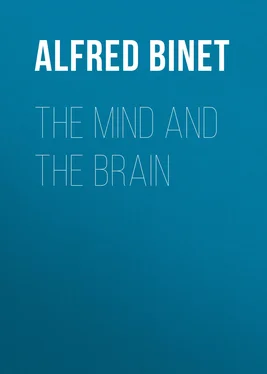Alfred Binet - The Mind and the Brain
Здесь есть возможность читать онлайн «Alfred Binet - The Mind and the Brain» — ознакомительный отрывок электронной книги совершенно бесплатно, а после прочтения отрывка купить полную версию. В некоторых случаях можно слушать аудио, скачать через торрент в формате fb2 и присутствует краткое содержание. Жанр: foreign_prose, foreign_religion, Философия, foreign_psychology, foreign_antique, на английском языке. Описание произведения, (предисловие) а так же отзывы посетителей доступны на портале библиотеки ЛибКат.
- Название:The Mind and the Brain
- Автор:
- Жанр:
- Год:неизвестен
- ISBN:нет данных
- Рейтинг книги:4 / 5. Голосов: 1
-
Избранное:Добавить в избранное
- Отзывы:
-
Ваша оценка:
- 80
- 1
- 2
- 3
- 4
- 5
The Mind and the Brain: краткое содержание, описание и аннотация
Предлагаем к чтению аннотацию, описание, краткое содержание или предисловие (зависит от того, что написал сам автор книги «The Mind and the Brain»). Если вы не нашли необходимую информацию о книге — напишите в комментариях, мы постараемся отыскать её.
The Mind and the Brain — читать онлайн ознакомительный отрывок
Ниже представлен текст книги, разбитый по страницам. Система сохранения места последней прочитанной страницы, позволяет с удобством читать онлайн бесплатно книгу «The Mind and the Brain», без необходимости каждый раз заново искать на чём Вы остановились. Поставьте закладку, и сможете в любой момент перейти на страницу, на которой закончили чтение.
Интервал:
Закладка:
Alfred Binet
The Mind and the Brain / Being the Authorised Translation of L'Âme et le Corps
BOOK I
1 1 L'Ame et la Corps. —Disagreeable as it is to alter an author's title, the words "Soul and Body" had to be abandoned because of their different connotation in English. The title "Mind and Body" was also preoccupied by Bain's work of that name in this series. The title chosen has M. Binet's approval.—Ed.
CHAPTER I
INTRODUCTION
This book is a prolonged effort to establish a distinction between what is called mind and what is called matter. Nothing is more simple than to realise this distinction when you do not go deeply into it; nothing is more difficult when you analyse it a little. At first sight, it seems impossible to confuse things so far apart as a thought and a block of stone; but on reflection this great contrast vanishes, and other differences have to be sought which are less apparent and of which one has not hitherto dreamed.
First let us say how the question presents itself to us. The fact which we must take as a starting point, for it is independent of every kind of theory, is that there exists something which is "knowable." Not only science, but ordinary life and our everyday conversation, imply that there are things that we know. It is with regard to these things that we have to ask ourselves if some belong to what we call the mind and others to what we call matter.
Let us suppose, by way of hypothesis, the knowable to be entirely and absolutely homogeneous. In that case we should be obliged to set aside the question as one already decided. Where everything is homogeneous, there is no distinction to be drawn. But this hypothesis is, as we all know, falsified by observation. The whole body of the knowable is formed from an agglomeration of extremely varied elements, amongst which it is easy to distinguish a large number of divisions. Things may be classified according to their colour, their shape, their weight, the pleasure they give us, their quality of being alive or dead, and so on; one much given to classification would only be troubled by the number of possible distinctions.
Since so many divisions are possible, at which shall we stop and say: this is the one which corresponds exactly to the opposition of mind and matter? The choice is not easy to make; for we shall see that certain authors put the distinction between the physical and the mental in one thing, others in another. Thus there have been a very large number of distinctions proposed, and their number is much greater than is generally thought. Since we propose to make ourselves judges of these distinctions, since, in fact, we shall reject most of them in order to suggest entirely new ones, it must be supposed that we shall do so by means of a criterion. Otherwise, we should only be acting fantastically. We should be saying peremptorily, "In my opinion this is mental," and there would be no more ground for discussion than, if the assertion were "I prefer the Romanticists to the Classicists," or "I consider prose superior to poetry."
The criterion which I have employed, and which I did not analyse until the unconscious use I had made of it revealed its existence to me, is based on the two following rules:—
1. A Rule of Method. —The distinction between mind and matter must not only apply to the whole of the knowable, but must be the deepest which can divide the knowable, and must further be one of a permanent character. A priori , there is nothing to prove the existence of such a distinction; it must be sought for and, when found, closely examined.
2. An Indication of the Direction in which the Search must be Made. —Taking into account the position already taken up by the majority of philosophers, the manifestation of mind, if it exists, must be looked for in the domain of facts dealt with by psychology, and the manifestation of matter in the domain explored by physicists.
I do not conceal from myself that there may be much that is arbitrary in my own criterion; but this does not seem to me possible to avoid. We must therefore appeal to psychology, and ask whether it is cognisant of any phenomenon offering a violent, lasting, and ineffaceable contrast with all the rest of the knowable.
The Method of Concepts and the Method of Enumeration. —Many authors are already engaged in this research, and employ a method which I consider very bad and very dangerous—the method of concepts. This consists in looking at real and concrete phenomena in their most abstract form. For example, in studying the mind, they use this word "mind" as a general idea which is supposed to contain all the characteristics of psychical phenomena; but they do not wait to enumerate these characteristics or to realise them, and they remain satisfied with the extremely vague idea springing from an unanalysed concept. Consequently they use the word "mind" with the imprudence of a banker who should discount a trade bill without ascertaining whether the payment of that particular piece of paper had been provided for. This amounts to saying that the discussion of philosophical problems takes especially a verbal aspect; and the more complex the phenomena a concept thus handled, contains, the more dangerous it is. A concept of the colour red has but a very simple content, and by using it, this content can be very clearly represented. But how can the immense meaning of the word "mind" be realised every time that it is used? For example, to define mind and to separate it from the rest of the knowable which is called matter, the general mode of reasoning is as follows: all the knowable which is apparent to our senses is essentially reduced to motion; "mind," that something which lives, feels, and judges, is reduced to "thought." To understand the difference between matter and mind, it is necessary to ask one's self whether there exists any analogy in nature between motion and thought. Now this analogy does not exist, and what we comprehend, on the contrary, is their absolute opposition. Thought is not a movement, and has nothing in common with a movement. A movement is never anything else but a displacement, a transfer, a change of place undergone by a particle of matter. What relation of similarity exists between this geometrical fact and a desire, an emotion, a sensation of bitterness? Far from being identical, these two facts are as distinct as any facts can be, and their distinction is so deep that it should be raised to the height of a principle, the principle of heterogeneity.
This is almost exactly the reasoning that numbers of philosophers have repeated for several years without giving proof of much originality. This is what I term the metaphysics of concept, for it is a speculation which consists in juggling with abstract ideas. The moment that a philosopher opposes thought to movement, I ask myself under what form he can think of a "thought," I suppose he must very poetically and very vaguely represent to himself something light and subtle which contrasts with the weight and grossness of material bodies. And thus our philosopher is punished in the sinning part; his contempt of the earthly has led him into an abuse of abstract reasoning, and this abuse has made him the dupe of a very naïve physical metaphor.
At bottom I have not much faith in the nobility of many of our abstract ideas. In a former psychological study 2 2 Étude experímentale de l'Intelligence. Paris: Schleicher.
I have shown that many of our abstractions are nothing else than embryonic, and, above all, loosely defined concrete ideas, which can satisfy only an indolent mind, and are, consequently, full of snares.
The opposition between mind and matter appears to me to assume a very different meaning if, instead of repeating ready-made formulas and wasting time on the game of setting concept against concept, we take the trouble to return to the study of nature, and begin by drawing up an inventory of the respective phenomena of mind and matter, examining with each of these phenomena the characteristics in which the first-named differ from the second. It is this last method, more slow but more sure than the other, that we shall follow; and we will commence by the study of matter.
Читать дальшеИнтервал:
Закладка:
Похожие книги на «The Mind and the Brain»
Представляем Вашему вниманию похожие книги на «The Mind and the Brain» списком для выбора. Мы отобрали схожую по названию и смыслу литературу в надежде предоставить читателям больше вариантов отыскать новые, интересные, ещё непрочитанные произведения.
Обсуждение, отзывы о книге «The Mind and the Brain» и просто собственные мнения читателей. Оставьте ваши комментарии, напишите, что Вы думаете о произведении, его смысле или главных героях. Укажите что конкретно понравилось, а что нет, и почему Вы так считаете.












